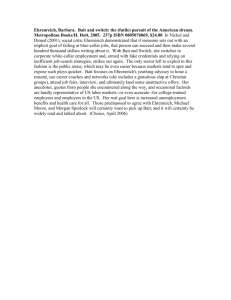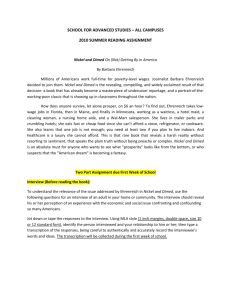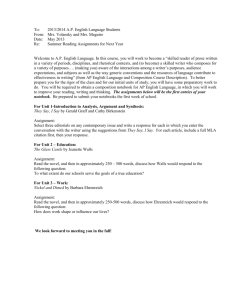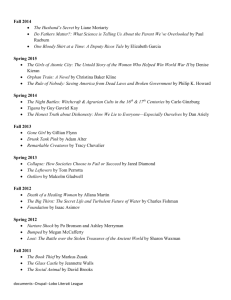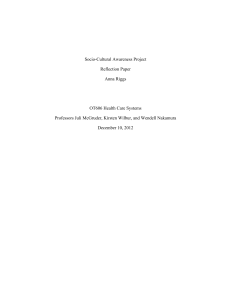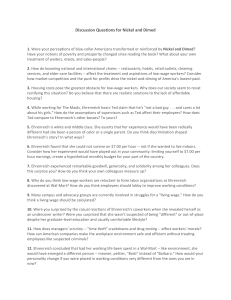Nickel Dimed - Common Reading Program
advertisement
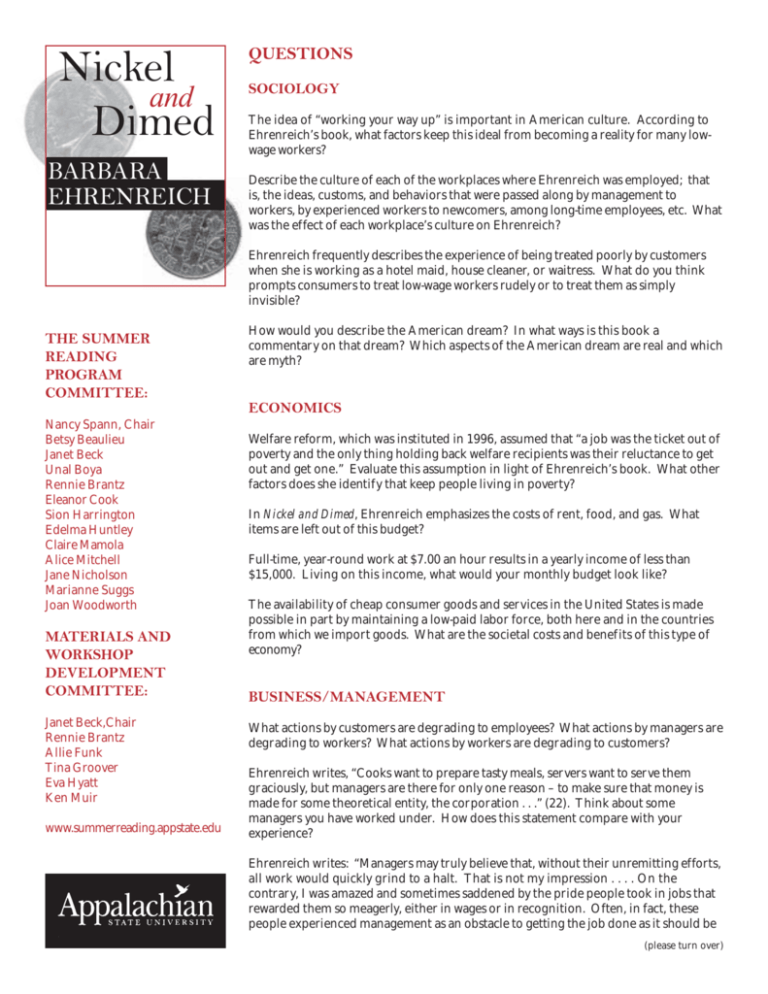
Nickel and Dimed BARBARA EHRENREICH QUESTIONS SOCIOLOGY The idea of “working your way up” is important in American culture. According to Ehrenreich’s book, what factors keep this ideal from becoming a reality for many lowwage workers? Describe the culture of each of the workplaces where Ehrenreich was employed; that is, the ideas, customs, and behaviors that were passed along by management to workers, by experienced workers to newcomers, among long-time employees, etc. What was the effect of each workplace’s culture on Ehrenreich? Ehrenreich frequently describes the experience of being treated poorly by customers when she is working as a hotel maid, house cleaner, or waitress. What do you think prompts consumers to treat low-wage workers rudely or to treat them as simply invisible? THE SUMMER READING PROGRAM COMMITTEE: Nancy Spann, Chair Betsy Beaulieu Janet Beck Unal Boya Rennie Brantz Eleanor Cook Sion Harrington Edelma Huntley Claire Mamola Alice Mitchell Jane Nicholson Marianne Suggs Joan Woodworth MATERIALS AND WORKSHOP DEVELOPMENT COMMITTEE: Janet Beck,Chair Rennie Brantz Allie Funk Tina Groover Eva Hyatt Ken Muir www.summerreading.appstate.edu How would you describe the American dream? In what ways is this book a commentary on that dream? Which aspects of the American dream are real and which are myth? ECONOMICS Welfare reform, which was instituted in 1996, assumed that “a job was the ticket out of poverty and the only thing holding back welfare recipients was their reluctance to get out and get one.” Evaluate this assumption in light of Ehrenreich’s book. What other factors does she identify that keep people living in poverty? In Nickel and Dimed, Ehrenreich emphasizes the costs of rent, food, and gas. What items are left out of this budget? Full-time, year-round work at $7.00 an hour results in a yearly income of less than $15,000. Living on this income, what would your monthly budget look like? The availability of cheap consumer goods and services in the United States is made possible in part by maintaining a low-paid labor force, both here and in the countries from which we import goods. What are the societal costs and benefits of this type of economy? BUSINESS/MANAGEMENT What actions by customers are degrading to employees? What actions by managers are degrading to workers? What actions by workers are degrading to customers? Ehrenreich writes, “Cooks want to prepare tasty meals, servers want to serve them graciously, but managers are there for only one reason – to make sure that money is made for some theoretical entity, the corporation . . .” (22). Think about some managers you have worked under. How does this statement compare with your experience? Ehrenreich writes: “Managers may truly believe that, without their unremitting efforts, all work would quickly grind to a halt. That is not my impression . . . . On the contrary, I was amazed and sometimes saddened by the pride people took in jobs that rewarded them so meagerly, either in wages or in recognition. Often, in fact, these people experienced management as an obstacle to getting the job done as it should be (please turn over) done . . . . In fact, it was often hard to see what the function of management was, other than to exact obeisance” (211-212). In your experience, is this a fair assessment of the role of managers? Why do you think some managers behave in this way? How could the role of management and the relationship between managers and workers be improved? In Nickel and Dimed, what are some of the ways that backlash against authoritarian managers is seen? GEOGRAPHY In each community in which she worked, Ehrenreich lived among other low-income people. What were the conditions of her housing like? What effects did her housing conditions have on her, as an individual and as a worker? In your home town, where do low-income people live? To the extent that you can, describe housing conditions there. Does your community have public transportation? If so, have you ever relied on it? If not, why not? If so, what was your experience like? What businesses are the largest employers of low-wage workers in your community? Do you know where most of these workers live? How do they get to work? PSYCHOLOGY Ehrenreich writes that her sister “has been through one low-paid job after another – phone company business rep, factory worker, receptionist – constantly struggling against what she calls ‘the hopelessness of being a wage slave.’” What does she mean by this? Based on Ehrenreich’s book, what are some of the psychological effects of working in a low-wage job? Often, when you meet new people, they ask what you do, or what you’re majoring in. What does this say about the role of work in American culture? What are some other ways in which people identify themselves? Ehrenreich asks, “If you hump away at menial jobs 360-plus days a year, does some kind of repetitive injury of the spirit set in?” Based on your reading of Nickel and Dimed, or your own experiences in the work world, what do you think? When people are made to feel powerless, they often try to find subtle, even subversive, ways of asserting power. How do we see this in Nickel and Dimed? How does this compare with your workplace experiences? POLITICAL SCIENCE Is drug testing for employment an invasion of civil rights? What about other employee surveillance systems, such as installing video cameras, monitoring e-mail and telephone calls, etc.? Explain your position. Which occupations routinely require drug testing, and which do not? Why? Welfare reform has been widely popular with politicians across the political spectrum. Why? What does this popularity tell us about American ideals, values, and myths regarding work and poverty? Welfare reform has put a lot of people in jobs. Has it also been effective in reducing poverty in America? In what ways may these goals be incompatible in our current economic system? RACE AND GENDER STUDIES Does Ehrenreich’s gender seem to have been an advantage or disadvantage in the work world? Why? The office manager at The Maids tells Ehrenreich that “cleaning is in our blood.” How do stereotypes about gender or race inf luence the job opportunities Ehrenreich is offered? To your knowledge, have you ever been given a certain type of job or been denied a job, in part, because of your race, ethnicity, or gender? (please go to next page) Think of jobs you have held in the past. Were most of your coworkers of the same gender and race as you? What was the gender and race of those above you in the company hierarchy? Ehrenreich refers to Ted, her manager at The Maids, as a “pimp” (115). Why does she use this metaphor? List as many low-wage jobs as you can. Are any of these more likely to be held by a person of a particular race, gender, or age? Why? Why are poverty rates higher among women in the U.S. than among men? EDUCATION What factors prevent many low-wage workers from getting a college education? In North Carolina, public universities are largely supported by taxpayers. Would you be willing to pay higher taxes in order to keep public education affordable? Would your parents? What are the alternatives? Students at public universities pay for only a fraction of the cost of their education; the rest is subsidized by taxpayers. How would you compare this form of “welfare” to the subsidized services the government makes available to the poor? What benefits and drawbacks does each subsidy system create for society? HEALTH What are some of the adverse health effects that Ehrenreich identifies as being associated with low-wage work? Are these hazards unavoidable, or is there some way that the jobs might be modified to reduce or eliminate these hazards? Many low-wage workers do not receive health benefits through their jobs. Who benefits from this system? What are its drawbacks, not only for the individual, but for society? Poverty and poor nutrition are often linked. In what situations does Ehrenreich find both herself and her coworkers eating poorly? According to Ehrenreich, what circumstances contribute to poor nutrition? PERSONAL Do you work? If so, what expenses do you pay for with your earnings? What expenses are covered by your parents or by some other source of funding? What values have your parents conveyed to you about work? What has been their attitude toward various jobs you have held? What have your experiences in the workplace been like? What experiences have you had with bosses? with coworkers? What changes could have made your workplace experience better? In what ways do you depend on low-wage workers in your everyday life? Try keeping track of the number of low-wage workers you encounter, or whose services you depend on, in an average day. Have you ever been subjected to drug testing or other surveillance systems on the job? Do you think that these systems are an effective management tool? How would you define the American dream? What conditions are necessary to fulfilling that dream?
